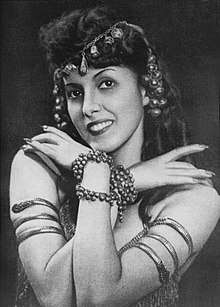Eros Volúsia
Heros Volúsia Machado (1 June 1914 — 1 January 2004), known as Eros Volúsia was a Brazilian dancer and actress. Her dancing style blended classical ballet to Afro-Brazilian dancing traditions.[1]
Eros Volúsia | |
|---|---|
 Eros Volúsia as Salome (1943) | |
| Born | Heros Volúsia Machado June 1, 1914 |
| Died | January 1, 2004 (aged 89) |
| Occupation | Dancer, actress |
| Parent(s) | Gilka Machado Rodolfo Machado |
Volúsia participated in several movies in Brazil and Hollywood, among them the 1942 film Rio Rita, starring Abbott and Costello.[2]
Biography
Volúsia was born in Rio de Janeiro, in 1914; her parents were the poets Gilka Machado and Rodolfo Machado.[3] Volúsia entered the ballet school in 1928, where she studied under Maria Olenewa.[4] She also attended the umbanda terreiro of João da Luz, where she had her first contact with Afro-Brazilian dances.[4]
In 1929, Volúsia made her first presentation at Theatro Municipal, dancing samba barefooted.[4] She would make another presentations in the following years, invited by cultural salonists like Paschoal Carlos Magno.[5] In the spirit of Brazilian modernism Volúsia researched Amerindian and African dances in order to create a "national dance" (bailado nacional).
In 1935 she participated of her first Brazilian film, Favela dos Meus Amores. She would be featured in other four films in Brazil.[5]
On 22 September 1941 she was featured at the cover of Life magazine. The following year she participated in a musical act in the MGM film Rio Rita, with Abbott and Costello. She would be compared to Carmen Miranda by local media.[3]
Filmography
| Year | Title | Role | Notes |
|---|---|---|---|
| 1935 | Favela dos Meus Amores | ||
| 1937 | Samba da Vida | ||
| 1942 | Rio Rita | Eros Volusia | |
| 1943 | Caminho do Céu | ||
| 1944 | Romance Proibido | Dançarina | |
| 1949 | Pra Lá de Boa | (final film role) |
References
- Inc, Time (1941-09-22). LIFE. Time Inc.
- III, Harris M. Lentz (2005-04-20). Obituaries in the Performing Arts, 2004: Film, Television, Radio, Theatre, Dance, Music, Cartoons and Pop Culture. McFarland. ISBN 9780786452095.
- Sadlier, Darlene J. (2010-10-01). Latin American Melodrama: Passion, Pathos, and Entertainment. University of Illinois Press. ISBN 9780252092329.
- Pereira, Roberto (2003). A formação do balé brasileiro: nacionalismo e estilização (in Portuguese). FGV Editora. ISBN 9788522504503.
- Mancebo Zenicola, Denise. "Eros Volúsia Performance, poéticas criativas e afirmação identitária".
| Wikimedia Commons has media related to Eros Volúsia. |